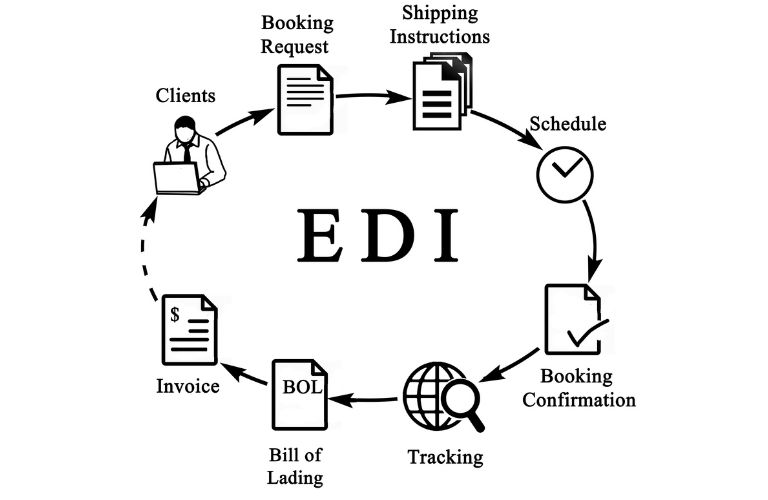What Are the Benefits of EDI in Trucking?
Published:Aug 12, 2025
5 min. read
Electronic Data Interchange (EDI) has fast become an invaluable tool for companies in the trucking and freight industry. This innovative technology solution helps streamline vital communications and transactions between key assets in the freight industry. Trucking companies that have started to or are considering integrating elements of EDI into their Transportation Management System (TMS) want to know what the benefits are of EDI in trucking and TenTrucks may be able to provide the answer with this list of key benefits.
Top 5 Benefits of EDI For Trucking and Freight Companies
Clear communication and efficiency are critical elements of the trucking and freight industry. This is even more important when you understand how many people need to have the right information and the right documents, from drivers and dispatchers to fleet managers and your customers. Electronic Data Interchange solutions are a valuable tool that can be integrated with your TMS platform to facilitate seamless communication with partners and customers.

EDI is more than just a simple data communication tool. It provides a wealth of benefits that include streamlining transactions by automating key documents, reducing the need for manual data entry, and improving processing times. Armed with EDI integrations, trucking and freight companies can be more efficient and more effective in their operations, which can lead to operational and financial growth.
Here is a better look at the key benefits of EDI for trucking and freight companies:
1. Improved Automation, Accuracy, and Efficiency
Maybe the most important benefit of EDI integrations is the ability to improve the automation and overall efficiency of your freight operations. The day-to-day paperwork in the freight industry can take time and effort, and mistakes add up to inefficiency. EDI integrations can automate key trucking and freight documents like invoices, freight bills, bills of lading, and load tenders, all but eliminating the need for manual data entry for your employees and allowing them to focus on more important tasks. The level of automation provided by an EDI integration leads to faster processing of documents with more accurate data in real-time, which in turn leads to more efficient business operations, from start to finish.
2. Reduced Costs
How much time do you and your employees spend on documentation? How much money does a clerical error cost your company in terms of direct costs and lost customers? EDI platforms that integrate with your Transportation Management System have the potential to reduce costs in a variety of ways and save you time and money. Paperless documentation translates to real cost savings on printing, postage, storage, material costs, and more, in addition to reduced labor costs and less time spent on manual data entry. The reduced errors that go hand in hand with automated EDI documentation also translate to reduced costs for corrected invoices, freight disputes, and possible fines.
3. Improved Freight Tracking
Tracking your cargo is a key aspect of the trucking and freight industry that impacts both fleets and customers. EDI integrations provide real-time tracking and shipment updates that help you know and understand where your cargo is. Regular shipment status updates allow you to better monitor the location of your trucks, be more proactive in avoiding potential delays, and provide accurate shipping updates for your customers. Access to real-time shipping data also allows trucking and freight companies to make more informed, data-based decisions.
4. Enhanced Communication
Like we mentioned above, improved and enhanced communication is a key benefit provided by Electronic Data Interchange solutions. It is critical that every person or entity in the supply chain receives the information they need and EDI integrations simplify communication between all parties with the automated exchange of data. This leads to improved collaboration and fewer complications within the supply chain, allowing you to build stronger relationships with shippers, freight brokers, and customers.
5. Potential for Growth
Small trucking businesses that hope to grow and achieve their financial goals will benefit from EDI integrations. Automated processes and more efficient operations make it easier for trucking and freight companies to take on new customers and increase volume without adding additional staff or having a negative impact on operations. Not only does EDI integration help provide effective and efficient service for new clients, it can help you set your company apart from other freight companies and find new clients.
READ MORE: What Are the Benefits of Electronic Logging Devices (ELD) in Trucking?
Are you looking for ways to improve freight operations for your company? Are you looking for technology that can help your business grow and thrive? Electronic Data Interchange technology may be the answer. Freight companies that want to know more about the benefits of Electronic Data Interchange in trucking have come to the right place and TenTrucks has the answers.
Contact TenTrucks today for more information on our TenTrucks TMS platform and dispatching services!